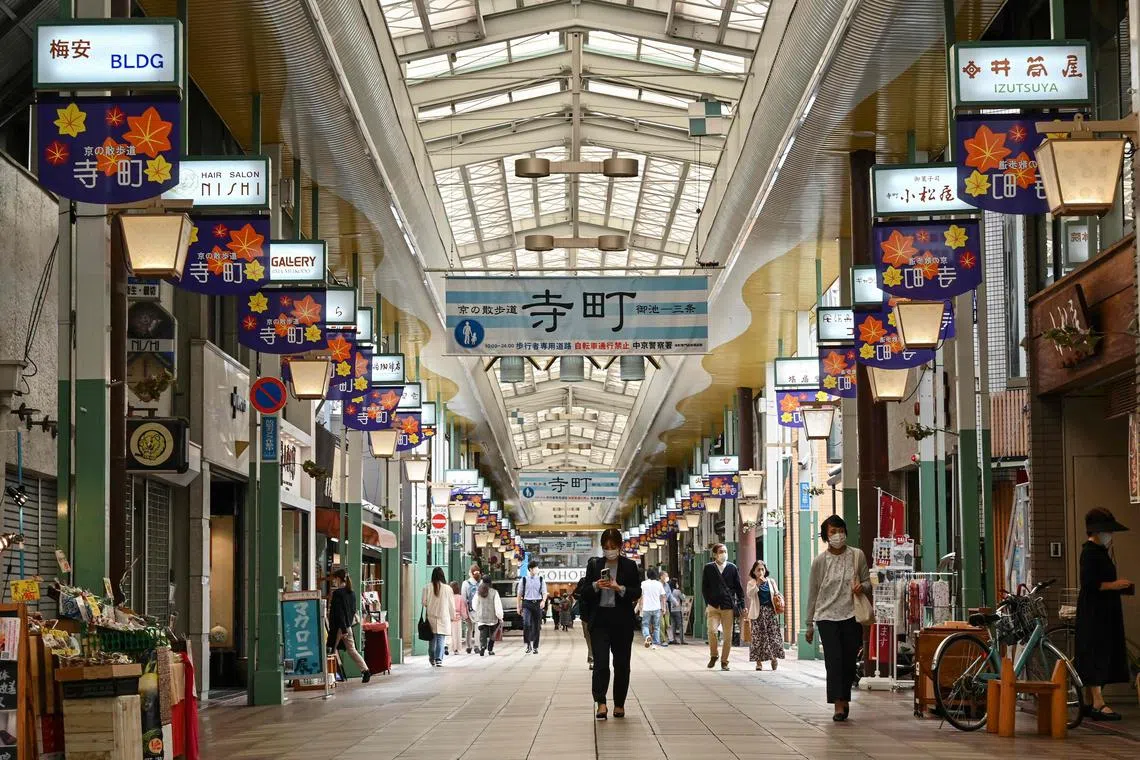Japan’s biggest firms take different views on economic outlook
Sign up now: Get ST's newsletters delivered to your inbox

Japan’s inflation hit a four-decade high in October, while real wages declined for the seventh straight month.
PHOTO: AFP
TOKYO – Japan’s biggest companies are taking different views on the state of the economy as clouds gather over global growth, while opened borders and relaxed restrictions
An index of confidence among the country’s biggest manufacturers edged down to seven in December from eight, while the reading for large service sector and construction companies rose, according to the Bank of Japan’s (BOJ) quarterly Tankan report released on Wednesday. Both results were stronger than expected by economists. A positive figure means optimists outnumber pessimists.
The fourth straight quarterly fall for manufacturers was largely led by makers of oil and coal products, but the improvement in a range of other sectors suggested that companies’ pessimism was not deepening across all sectors. Non-manufacturers on the other hand took a much more positive view amid Japan’s reopening to international visitors and an improved outlook for virus cases after the summer’s surge. The index for confidence improved to 19 from 14.
“Manufacturers, especially the auto sector, are cautious because of slowdown risks in the US and Europe,” said Mr Nobuyasu Atago, chief economist at Ichiyoshi Securities and a former BOJ official. “On the other hand, non-manufacturers are getting a lift from the end of Covid-19 restrictions.”
Reflecting the improved domestic environment, the mood among personal service and hospitality providers improved markedly. Sentiment among large hotels and restaurants turned neutral after 11 quarters of deep pessimism during the Covid-19 pandemic. Japan’s borders had been closed to tourists for more than two years.
Active corporate investment driven by the softer currency and pent-up demand are other positive factors. The yen’s plunge
A separate report showed that the country’s machine orders rose 5.4 per cent in October from the previous month, also pointing to resilient capital investment in the current quarter.
Still, the edging down in sentiment for goods producers suggests that Japanese manufacturers remain on alert for a possible worldwide slowdown of economies. Following the US Federal Reserve’s rapid tightening of monetary policy,
Uncertainty continues to hang over China’s virus-related policies, though it has finally begun a relaxation of restrictions.
Accelerating price hikes also remain a worry. Japan’s inflation hit a four-decade high in October, while real wages declined for the seventh straight month.
Prime Minister Fumio Kishida’s administration aims to protect consumers from the damage of accelerating inflation through its latest economic stimulus measures. The package, worth 39 trillion yen in fiscal spending, includes anti-inflationary measures and various aids for businesses to keep growing amid rising uncertainty.
The Tankan showed Japanese companies expect the exchange rate to be 130.75 yen against the US dollar this fiscal year, compared with 125.71 in the previous survey. The yen has made gains in recent weeks, and got a further boost overnight after weaker than expected US inflation figures put the possibility of a pause from the Fed’s interest rate hikes in view.
The BOJ will take the Tankan outcome into account at its upcoming policy meeting scheduled for next Monday and Tuesday.
“There’s continued concern within the manufacturing industry about a downturn due to the global economic slowdown,” said Mitsubishi UFJ Research & Consulting economist Shumpei Fujita. “The BOJ won’t halt monetary easing here, but will continue to address future risks with monetary policy.” BLOOMBERG


